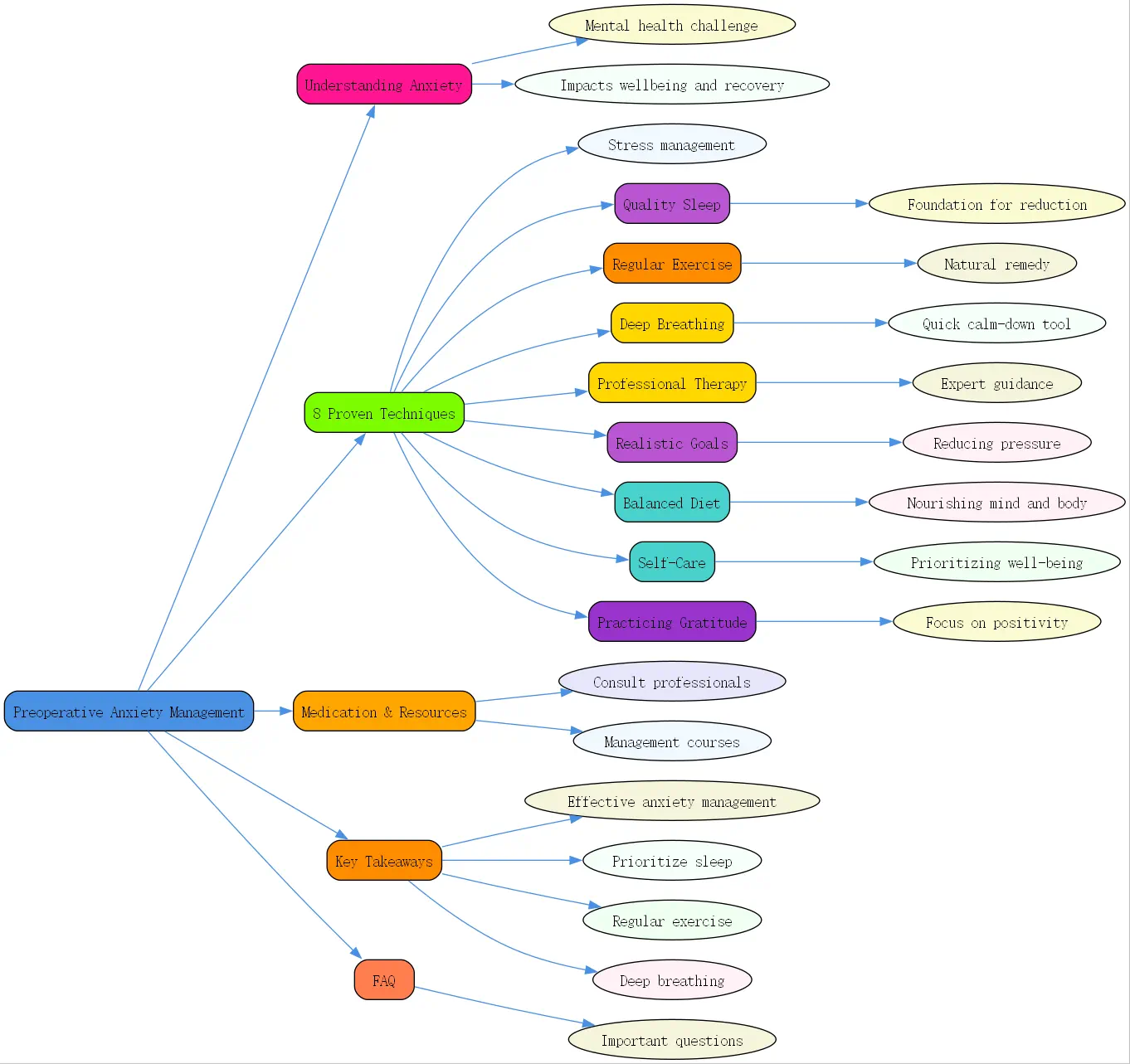Understanding Preoperative Anxiety

Anxiety is a mental health challenge that affects millions of people worldwide. It can easily interfere with your daily life, affecting your work, personal relationships, and preventing you from achieving your personal goals. This is especially true for individuals facing surgical procedures, where preoperative anxiety can significantly impact both mental wellbeing and physical recovery.
The good news is that there are numerous tools and techniques you can use to better manage your anxiety and improve your quality of life. At BrainTalking, we’ve compiled evidence-based strategies that have proven effective for many of our clients facing preoperative anxiety and other anxiety-related challenges.
8 Proven Techniques for Anxiety Stress Management
1. Quality Sleep: The Foundation for Anxiety Reduction
Quality sleep is a simple yet often overlooked technique for managing preoperative anxiety. When you’re not getting enough sleep, your body tends to release more cortisol鈥攁 hormone released in response to stress. Elevated cortisol levels lead to increased anxiety, creating a vicious cycle that can be difficult to break.
Getting quality sleep improves your mood significantly. Sleep deprivation typically leads to irritability and fatigue, making it much more difficult to manage anxious thoughts and feelings. Well-rested individuals find it easier to cope with anxiety-provoking situations, particularly those surrounding medical procedures.
Additionally, quality sleep enhances concentration, cognitive function, and focus鈥攁ll critical attributes that put you in a better position to manage preoperative anxiety. A well-rested mind can better process information about upcoming procedures and make rational decisions rather than being overwhelmed by fear.
2. Regular Exercise: A Natural Anxiety Remedy
Exercise is a powerful tool in your preoperative anxiety management arsenal. When you exercise regularly, your body releases endorphins鈥攏atural feel-good chemicals in your brain. These endorphins help reduce feelings of anxiety and promote an overall sense of well-being, which is particularly valuable before a surgical procedure.
Similar to quality sleep, regular exercise reduces the production of stress hormones like cortisol. Lower cortisol levels mean less anxiety and a greater ability to remain calm in stressful situations. Exercise also promotes relaxation and deep breathing, which combine to create a sense of calm and reduce anxiety symptoms.
An often-overlooked benefit of regular exercise is its positive impact on self-esteem and confidence. When you feel physically strong and healthy, you’re more likely to approach challenging situations鈥攍ike surgery鈥攚ith a positive mindset. Exercise also provides a positive form of distraction, helping you focus less on anxious feelings and more on the physical activity at hand.

3. Deep Breathing Exercises: Your Quick Calm-Down Tool
Deep breathing is a remarkably effective technique for managing preoperative anxiety. This practice helps relax your body by lowering your heart rate, blood pressure, and muscle tension鈥攁ll physiological responses that can intensify feelings of anxiety. By engaging in deep breathing exercises, you can create a sense of calm and overall well-being.
Like other anxiety management techniques, deep breathing helps reduce the production of cortisol, which is often elevated in people experiencing anxiety. This is particularly important in the days and hours leading up to a surgical procedure, when stress levels typically peak.
Deep breathing also improves oxygen flow throughout your body, reducing feelings of fatigue that often accompany anxiety. By focusing on your breath, you redirect attention away from anxious thoughts and feelings, helping you better recognize and manage anxiety symptoms as they arise. This mindfulness aspect makes deep breathing an invaluable tool for immediate anxiety relief in clinical settings.
4. Professional Therapy: Seeking Expert Guidance
When dealing with significant preoperative anxiety, seeking assistance from a therapist can be an excellent way to improve your mental health. Professional therapists can provide personalized strategies and support tailored to your specific anxiety triggers and concerns about upcoming medical procedures.
Online therapy services have made professional mental health support more accessible than ever. These platforms connect you with licensed and experienced therapists who can help with a wide range of issues, including preoperative anxiety management. The convenience of online therapy allows you to receive support from the comfort of your home, which is particularly valuable when mobility might be limited before or after surgery.
Professional therapists can teach you specific cognitive-behavioral techniques to challenge anxious thoughts, develop coping mechanisms, and prepare mentally for medical procedures. This expert guidance can make a significant difference in how you experience the preoperative period and your recovery afterward.
5. Setting Realistic Goals: Managing Expectations and Reducing Pressure
Setting realistic goals is a crucial but often overlooked aspect of preoperative anxiety management. Anxiety can stem from feeling overwhelmed by expectations or putting too much pressure on yourself regarding recovery timelines or outcomes. By establishing realistic goals, you reduce this pressure and consequently lower anxiety levels.

Realistic goals help you feel more in control of your life and emotions. This sense of control is particularly important when facing surgery, as many aspects of the procedure may feel beyond your control. By focusing on what you can manage鈥攕uch as following pre-surgery instructions or completing small daily recovery tasks鈥攜ou create islands of certainty in an uncertain situation.
Setting and achieving realistic goals also provides a sense of accomplishment and promotes a more positive outlook. Rather than becoming overwhelmed by the entirety of the surgical experience, breaking it down into manageable steps helps you remain motivated and on track, leading to fewer negative thoughts and better decision-making regarding your health.
6. Balanced Diet: Nourishing Your Mind and Body
A balanced diet plays a significant role in anxiety stress management techniques, particularly for those preparing for surgery. Proper nutrition helps regulate blood sugar levels, preventing the fluctuations that can lead to irritability, tension, and increased anxiety symptoms.
The gut-brain connection is increasingly recognized as important for mental health. Eating a balanced diet rich in fiber and probiotics supports gut health, which in turn positively affects brain function and mood regulation. This connection makes nutritional choices a key component of comprehensive preoperative anxiety management.
Anti-inflammatory foods like fruits, leafy green vegetables, and whole grains can help reduce inflammation, which has been linked to increased anxiety. A diet that promotes sustained energy levels throughout the day can also prevent the energy crashes that often trigger or worsen anxiety symptoms.
For those managing preoperative anxiety, it’s particularly important to limit caffeine, alcohol, and recreational drugs. These substances can trigger anxiety symptoms and panic attacks, interfere with sleep quality, and potentially interact with medications. Maintaining a clean diet before surgery not only supports physical healing but also creates the optimal conditions for emotional stability.
7. Self-Care Practices: Prioritizing Your Well-being
Self-care activities like yoga, meditation, and deep breathing are powerful tools for preoperative anxiety management. These practices help relieve anxiety, lower tension levels, and create an overall sense of calm that’s invaluable when preparing for a medical procedure.
Regular self-care improves physical health, which is closely connected to mental well-being. When you feel physically well, you’re better equipped to handle the emotional challenges that come with surgery. Self-care practices also boost self-confidence and self-esteem, putting you in a stronger position to manage anxiety symptoms.
Self-care creates a feeling of being in control, which is particularly important when facing surgery. Simple activities like taking a warm bath, listening to calming music, or practicing guided imagery can help you feel more relaxed, centered, and in command of your emotional state. These moments of calm provide essential respite from anxiety and help build resilience for the challenges ahead.
8. Practicing Gratitude: Shifting Your Focus to Positivity
When dealing with preoperative anxiety, it’s easy to become fixated on negative thoughts and feelings. Practicing gratitude deliberately shifts your focus to positive aspects of your life, helping to counterbalance anxiety with optimism and appreciation. This mental reframing can significantly reduce anxiety levels.
Gratitude promotes self-reflection and allows for a more accurate assessment of your thoughts and feelings. Rather than catastrophizing about potential surgical outcomes, gratitude practices help you maintain perspective and recognize the support and resources available to you.
Focusing on positive elements in your life increases resilience, giving you strength to cope with challenging situations like surgery. Gratitude for the people in your life鈥攊ncluding healthcare providers, family, and friends鈥攃an strengthen your support system and remind you that you’re not facing surgery alone. This social connection is a powerful buffer against anxiety and contributes significantly to emotional wellbeing during the preoperative period.
Anxiety Medication Management & Additional Resources
While the techniques above form the foundation of effective preoperative anxiety management, some individuals may benefit from medication support. Always consult with healthcare professionals about anxiety medication management options. Your doctor can determine if short-term anti-anxiety medications might be appropriate for your situation, particularly if anxiety is severe or interfering with necessary medical care.
For those seeking more structured support, anxiety management courses offer comprehensive education and practice in anxiety-reduction techniques. BrainTalking offers specialized courses focusing on preoperative anxiety management, providing both general anxiety management skills and specific strategies for medical contexts.
These courses typically cover all the techniques mentioned above in greater depth, with guided practice sessions and personalized feedback. They can be particularly valuable for individuals with a history of anxiety who are facing significant medical procedures.
Key Takeaways for Effective Preoperative Anxiety Management
- Prioritize quality sleep to regulate cortisol levels and improve cognitive function
- Incorporate regular exercise to release endorphins and reduce stress hormones
- Practice deep breathing exercises to lower physiological anxiety responses
- Consider professional therapy for personalized anxiety management strategies
- Set realistic goals to create a sense of control and reduce overwhelming pressure
- Maintain a balanced diet that supports gut health and stable energy levels
- Engage in regular self-care practices to promote relaxation and wellbeing
- Develop a gratitude practice to shift focus from anxiety to positive aspects of life
- Consult healthcare professionals about appropriate anxiety medication management when needed
- Explore structured anxiety management courses for comprehensive support
Frequently Asked Questions
How early should I start implementing preoperative anxiety management techniques before surgery?
Ideally, you should begin implementing anxiety management techniques as soon as surgery is scheduled. Starting early allows you to establish healthy routines and develop proficiency in techniques like deep breathing and meditation. However, even beginning these practices just days before surgery can still provide significant benefits.
For those with known anxiety disorders or previous difficult experiences with medical procedures, working with a mental health professional on preoperative anxiety management 4-6 weeks before surgery can be particularly beneficial. This timeline allows for potential medication adjustments if needed and provides ample opportunity to practice and refine coping strategies.





